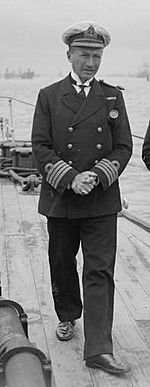Barry Domvile facts for kids
Quick facts for kids
Sir Barry Domvile
|
|
|---|---|
 |
|
| Born | 5 September 1878 |
| Died | 13 August 1971 (aged 92) |
| Allegiance | |
| Service/ |
|
| Rank | Admiral |
| Commands held | HMS Miranda HMS Tipperary HMS Centaur HMS Curacoa HMS Royal Sovereign Royal Naval College, Greenwich |
| Battles/wars | World War I |
| Awards | Knight Commander of the Order of the British Empire Companion of the Order of the Bath Companion of the Order of St Michael and St George |
Admiral Sir Barry Edward Domvile, KBE, CB, CMG (5 September 1878 – 13 August 1971) was a high-ranking Royal Navy officer who was interned during the Second World War for being a Nazi sympathiser. Throughout the 1930s, he had expressed support for Germany's Adolf Hitler as well as pro-Nazi and anti-Semitic sentiments.
Domvile was the son of Admiral Sir Compton Domvile and followed his father into the Royal Navy in 1892. In 1912, he became Assistant Secretary to the Committee of Imperial Defence, and during World War I he commanded the destroyer HMS Miranda, the destroyer HMS Tipperary, the cruiser HMS Centaur and then the cruiser HMS Curacoa. After the war, he became Director of Plans in 1920, and Chief of Staff to the Commander-in-Chief, Mediterranean in 1922 before becoming, in 1925, commanding officer of the battleship HMS Royal Sovereign.
He served as Director of Naval Intelligence from 1927 to 1930, then commanded the Third Cruiser Squadron from 1931 to 1932, and served as President of the Royal Naval College, Greenwich from 1932 to 1934.
Far-right activism
Domvile visited Germany in 1935 and was impressed by many aspects of the Nazi government. He was invited to attend the Nuremberg Rally of September 1936 as a guest of German Ambassador Joachim von Ribbentrop. Domvile became a council member of the Anglo-German Fellowship and founded the Anglo-German organisation The Link.
Domvile supported St. John Philby, the anti-Semitic British People's Party candidate in the Hythe by-election of 1939, and visited Salzburg that summer, which attracted some criticism.
Domvile was prominent in British far-right circles as the prospect of war seemed imminent in the late 1930s. At one meeting of the Right Club, which had been set up in May 1939, he declared the need for "a bloody revolution" in Britain and added "I am ready to start one right away."
Domvile's pro-Nazi and anti-war sympathies were expressed in an endorsement to the 1939 book The Case For Germany.
World War II
In June 1940, Domvile's mistress, Mrs Olive Baker, was arrested for distributing leaflets promoting Reichssender Hamburg. .....
Domvile himself was interned during World War II under Defence Regulation 18B from 7 July 1940 to 29 July 1943.
During his wartime captivity, he wrote an autobiographical memoir, From Admiral to Cabin Boy. It was first published in 1947 and republished in 2008.
Later life
Domvile largely faded from public life in the postwar period. He was a supporter of the League of Empire Loyalists but was never more than a peripheral figure in that group. He was a member of the National Front's National Council from its formation in 1967 to his death in 1971.
Books
- By and Large, pub Hutchinson, 1936 (His autobiography)
- From Admiral to Cabin Boy (1947; the cabin referred to is his cell at Brixton prison during internment) ISBN: 0-89562-099-5; online
- Look to Your Moat (A history of British naval and merchant seamen)
- The Great Taboo: Freemasonry
- Straight from the Jew's Mouth
- Truth about Anti-Semitism

